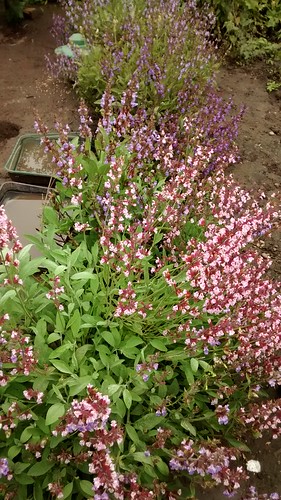We grow our own food in a suburban village in the North East of England. Follow us as we keep up the battle to be self-sufficient.
Monday 30 June 2014
Fab Radio International
It seems this blog is read by many people in distant and unusual places - such as Manchester! Recently I was emailed by Simon Besson, the presenter of a gardening programme on Manchester based Fab Radio International, who asked if I would like to be interviewed for his programme, The Dirt. Not being the shy and retiring type, I readily agreed. The interview went ahead on Sunday 29th June. Alas, halfway through and the technology became as reliable as the weather. We lost the line but you can hear the part of the interview before the phone went AWOL on this link. I am about 25 minutes into the recording.
The jam making season begins
The arrival of the first rhubarb crops heralds the arrival of the jam making season. So far we've make rhubarb and orange jam and rhubarb, ginger and apple jam. We swapped some eggs for more rhubarb yesterday at our swapping event so more jam making will be coming up (though pie making may be on the agenda as well). I also have some gooseberries in the fridge which I picked near the start of June so won't last much longer if they aren't used up. They will go into gooseberry and elderflower jam.
We have some weeding to do
We use Dad's allotment as our main area for growing vegetables as it is free of poultry. However, we hadn't been for a while. So our visit there last week brought home to us just how much weeding we need to do. I will head back there some time this week and take a few sacks with me. The hens and ducks can have all the weeds once I've pulled them out.
Cleaning the duck pond
One of the discoveries I made when I first got ducks two years ago was that they will make a mess of a pond in little time at all. Despite having extended and deepened the pond last year, we still need to drain, clean and refill it on a regular basis. The weather has been warm and dry for most of the past two months so the water level of the pond has dropped. What was left was quite revolting so last Thursday I drained it and poured the mucky water over the beds I planted with potatoes recently. I cleaned out the silt at the bottom, which also went on to the potato beds, and then refilled the pond with fresh water.
I am not a great fan of using tap water for watering the garden or filling the pond. Water may be a renewable resource, but the energy that goes into cleaning it and pumping it is not so I use tap water sparingly. However, there are times when that is simply not possible. The water butts on the allotment were empty and there was no other water supply. So, we borrowed the water supply from a nearby house (with their permission of course) and refilled the pond. It took about 3 hours to get it back up to the right level. My estimate was that 2.5 tonnes of water went into it.
As you can see, the ducks were rapidly back on to the water and were loving it.
Chicken exchange
Our friend Johnnie, with whom we swapped three of the cream legbar chicks (one cockerel and two hens) we hatched last year, gave us two batches of eggs from those birds recently. The deal was that once the eggs had hatched, I would give him two hen chicks. At the end of last week, the two hen chicks (each about 8 weeks old) were handed over to Johnnie who had spent the previous week building another chicken run in his allotment. The two chicks went straight into the new run. They are doing well. From that batch of eggs we now have 4 cockerels and one hen. We have various options for what to do with the cockerels. We could swap them, sell them or fatten them up for the table. Given that the 2nd batch of eggs has given us four more cockerels and only two hens, I suspect all the above options will be exercised.
Browsing
I'm all for trying to maximize the amount of feed I can give to our livestock that is grown locally and, very importantly, is free. The hedges on our allotment site are over 100 years old (I have seen them marked on on late Victoria maps of our village) and are still growing strongly despite their age. Gradually I am chopping back some of the bigger, high branches so that the height of the hedges can be brought down to about 2.5 - 3 metres. I take a few branches a day from around the site and then give them to the goats who browse on them. Many of the other allotment holders here also pass on their hedge cuttings and branches they have chopped back. The goats particularly like hawthorn (of which we have a huge quantity), ash, elder, ivy and bramble.
So the goats get fed, the hedges are better managed and I eventually have lots of sticks that can be chopped up to be burnt when I eventually get the Victorian out-building solid fuel heater I bought last year into use.
Wild trout and lovage soup
We have done a couple of food swaps recently for freshly caught trout so yesterday, for our monthly community cafe at Marley Hill, we invented a new soup - wild trout and lovage.
Ingredients were fish stock (we have some homemade in the freezer), fresh trout (simmered in a pan for a few minutes to make it easier to remove the skins and bones which should then be kept to make more stock), a handful of potatoes and onions and some fresh lovage from the herb garden. Put the veg, lovage and stock into a pan and add a bit of water if needed and then bring to the boil. Leave to simmer until the potatoes are soft. Blend the soup and then break up and add in the fish pieces. Add seasoning and bring to the boil. Leave to simmer until the fish is cooked through.
Low Fell Fayre
On Saturday I had a table at the Low Fell Fayre in Gateshead to promote Marley Hill Community Centre and the monthly cafe and surplus food swapping event we have there (the last one was yesterday and the next is on 27th July.
I took along the newly hatched ducklings which proved a hit with people of all ages. It meant I had a busy table though not every person visiting it bought jam or eggs! I think the ducklings are now the most photographed birds in Gateshead.
A hay crop?
I discovered a few days ago that Gateshead Council had cut the long grass on the land at the rear of Marley Hill Community Centre (the building where we put on our monthly cafe). The cut grass has been left behind and is drying out in the sun. The resulting hay may not be of the finest quality but I am going to have a go at raking it up, turning it and then saving it. I'll then have a go at feeding it to my goats (we have nearly finished the hay we got last year for them.)
Friday 27 June 2014
Three Welsh girls
These three birds are the Welsh Harlequin ducklings we hatched a couple of months ago. One of them is darker than the others and we had been assuming that that one was female and the other two were drakes. We have now started to question this. We've not kept Welsh Harlequins before so we are on something of a learning curve but our attempts at working out which one is which sex is based on our experience of keeping khaki campbells. Having now looked up Welsh Harlequins on Wikipedia, we may now be facing a situation in which all three are ducks. The bills turns out to be the giveaway. Ducks' bills are black, drakes are yellow. And as you can see, all three have black bills. This may mean we have to incubate more eggs so that we have a drake to be able to start a breeding group. The Welsh Harlequin is on the rare breed list so increasing their numbers is important.
Hives of activity
Our three recent swarm hives are doing well. The weather over the past few days has been ideal for the bees - warm and dry - so it hasn't just been the new hives that have been active.
The photo above is of the newest of the hives. This contains the swarm collected last Friday by David. The photo below shows the two hives (left and right) which contain the swarms I collected earlier this month. The middle hive is our biggest. That started life in 2012 as a swarm but earlier this year, the neighbouring hive became queenless so we added it on to the central one. The result is a super strong hive.
7 new ducklings
Yesterday morning saw 7 ducklings hatch in our incubator. They are mainly khaki campbells but there will be some aylesbury and magpie thrown into the mix as well. 8 eggs were in the incubator. I checked the one that didn't hatch. It still had its yoke so must have been infertile.
The ducklings will remain in the aquarium until Sunday evening. They will go with me to the Low Fell fayre tomorrow and to the Marley Hill Community Centre craft market on Sunday - we will be running the cafe at the same time elsewhere in the building. We are hoping the ducklings will have enough of a cute factor to encourage people to donate to the Community Centre funds!
After the two fayres, the ducklings will be moved to a larger brood box and then, after a couple of weeks, will be moved outdoors into the run in the back garden before going to the allotment where all our adult ducks live.
Tuesday 24 June 2014
Back home
I am now back home from my short trip to London and Copenhagen. I was gone for only 5 days but in that time the older chicks have got bigger and are clearly wanting to be released from the chick house to joint the flock; the younger chicks have grown rapidly and their colouring has come on in leaps and bounds (especially the barnevelders which are looking great), the strawberries are looking bigger than ever and our duck eggs are pipping. The ducklings inside are making a great noise, chirping away.
A sack of pigeons is waiting for me and I am about to cut off the breasts. The elderflower champagne is ready to be transferred from the fermenting bucket to bottles and the gooseberries are ready for picking and making into jam. It's all go here!
A sack of pigeons is waiting for me and I am about to cut off the breasts. The elderflower champagne is ready to be transferred from the fermenting bucket to bottles and the gooseberries are ready for picking and making into jam. It's all go here!
Long distance beekeeping
Typical! The moment I go away an email arrives asking if I could recover a bee swarm that had formed up in a garden in Marley Hill, the next village up the road from Sunniside where I live. On Thursday last week I arrived at Newcastle Central Station and whilst waiting for my train to London to arrive, the email reached me. Fortunately, a person living near the garden is a former beekeeper and knew how to catch the swarm. David was not joining me on my trip so I called him to ask if he could collect the swarm. In the early hours of Friday morning, he collected the swarm which was in a skep which he then wrapped in a sheet and took to one of our apiaries where he had already set up a hive. I was on my way to Stansted airport when David's photo of the new hive arrived.
A day later and I was in Copenhagen. Another message arrived, this time from Hexham Beekeepers Association to local members. A bee swarm had formed up at Burnopfield, 3 villages up the road from us. Could anyone collect it? I sent David a message about it but the reply came back that we had now run out of hive equipment. We don't know if anyone managed to collect the swarm.
A day later and I was in Copenhagen. Another message arrived, this time from Hexham Beekeepers Association to local members. A bee swarm had formed up at Burnopfield, 3 villages up the road from us. Could anyone collect it? I sent David a message about it but the reply came back that we had now run out of hive equipment. We don't know if anyone managed to collect the swarm.
Growing chicks
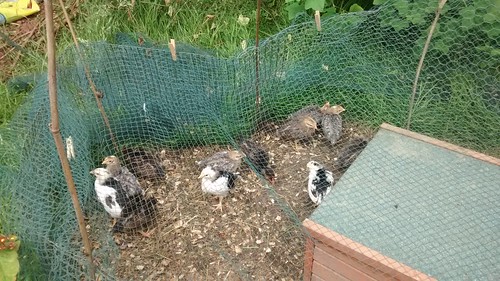
We moved our older chicks to the chick house on the allotment last week, allowing us to move the younger chicks from the brooder box into the chick run in the back garden. The younger chicks are now about 3 weeks old. There are 12 of them - 6 are cream legbars, 3 are barnvelders and 3 are exchequer leghorns. They will be in the chick run for about another 10 days before being moved to the allotment. At that point, we will need the chick run for the next batch of ducklings which are due to hatch later this week.
Making the elderflower champagne
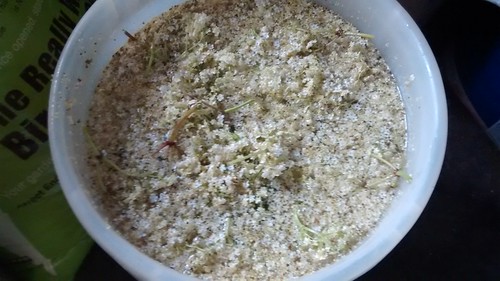
I've been away for a few days but before I headed off, I picked a large quantity of elderflower to make elderflower champagne. It went into a large fermentation bucket with sugar, vinegar and lemon juice and has been brewing over the weekend. When I get back, it will go into bottles where it will complete its fermentation. The first bottles can be opened after just a few weeks though we still have some from last year to use up.
Thursday 19 June 2014
Hive checks
I carried out a check of our hives at our Whickham apiary on Sunday. Unfortunately, 2 of the 3 colonies I rescued from Sun Hill, the building being demolished in Sunniside, have not survived. Our 3 hives were doing very well however. I added a super to the one hive that did not have one so that we can collect honey from it. The other two hives already had supers. One was nearly full with honey and will be harvested, possibly in July. The other super was still empty but the hive is strong and we expect the bees to start filling the super shortly.
At our Sunniside apiary today, the sun brought our the bees in big numbers. The two recent swarms have settled well into their hives. The three existing hives meanwhile were very busy. One in particular is huge as it consists of a super with two brood boxes above it, and on top is another super (for collecting the honey).
I'm getting a number of requests from people to buy honey. It will be a few weeks yet before it's ready - watch this space.
At our Sunniside apiary today, the sun brought our the bees in big numbers. The two recent swarms have settled well into their hives. The three existing hives meanwhile were very busy. One in particular is huge as it consists of a super with two brood boxes above it, and on top is another super (for collecting the honey).
I'm getting a number of requests from people to buy honey. It will be a few weeks yet before it's ready - watch this space.
Wednesday 18 June 2014
Pigeon breasts
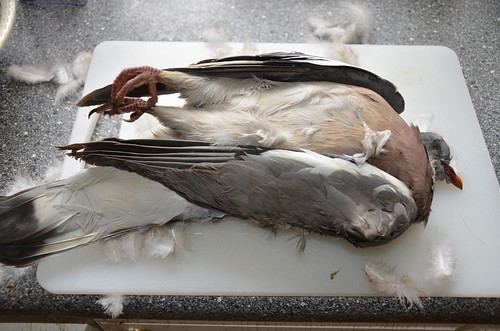
A friend of ours gave us 4 pigeons on Monday he picked up at a shoot over the weekend. The breast is about the only part of the bird that can be used (though if anyone has a suggestion for other parts, please inform me). I stripped the breasts from the pigeons yesterday and the plan was to have them grilled. However, we got sidetracked and the dinner we planned was not made. Instead, the breasts have gone into the freezer. We'll have them in a couple of weeks.
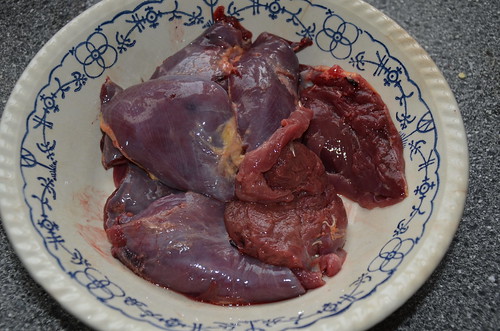
Mini duck egg
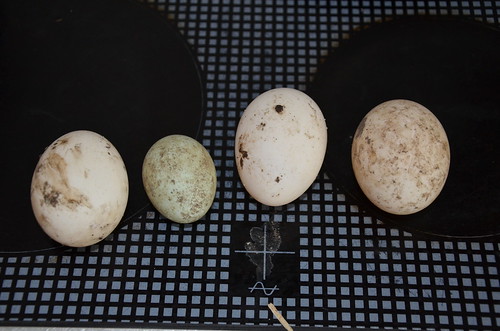
These were the eggs laid by our ducks yesterday. Note the small one. This was laid by our aylesbury. She is the only one laying green eggs. She is also the oldest of our ducks. We got her as a duckling in September 2012. Despite being nearly 2 years old, she continues to be a good layer, producing an egg nearly every day since mid March. We have to expect however, as she gets older, the occasional mishap such as an unusually small egg.
A close up of the cream legbar chicks
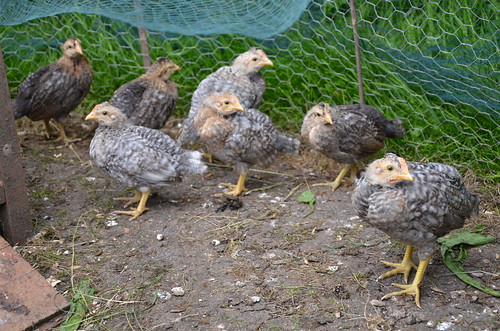
I took this photo shortly before I moved the cream legbar chicks to the chick house on the allotment. The different feathering on the cockerels and hens is becoming increasingly obvious. The hens are already developing their adult colouring of reds, browns and greys. The cockerels however are more grey at this point but will soon start to grow their adult plumage. If they are anything like their father, they will be very attractive birds.
Bangers and mash
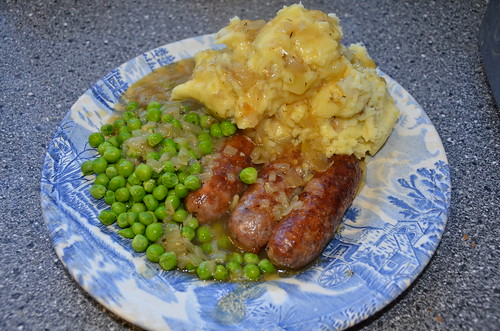
A traditional English dish, bangers and mash is popular over here but until recently, our version was always with pork sausages. That was because they were made from our tamworth pigs. However, the recent discovery of a beef farm near us that is happy to swap their beef for our pork means we now have beef back in our diet. On a recent exchanged, we got some beef sausages. Needless to say, they were superb.
Tuesday 17 June 2014
Rebuilding the polytunnel
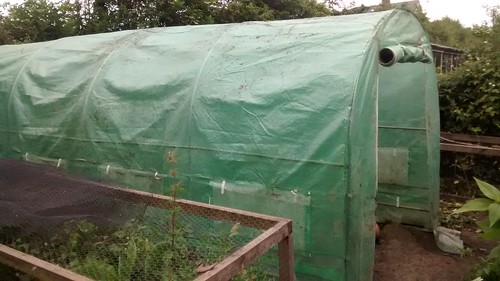
Our two polytunnels were badly damaged in storms last autumn. We dismantled them rather than let them endure further damage from the winter weather. Tonight we reassembled one of them and cannibalized parts from the other to ensure it all held together. The greenhouse is full of tomato plants waiting to be planted in the polytunnel. That's a job for the coming days.
Chicks on the move
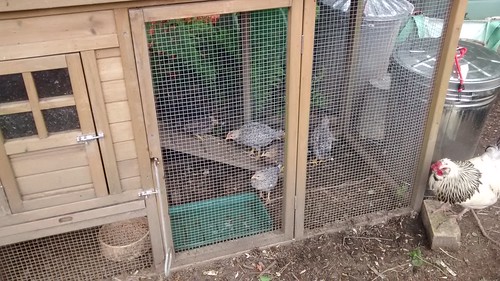
The first set of chicks we hatched last month were moved from their temporary run in the back garden this morning to the chick house on the allotment. There are 7 birds in this batch, 4 of which are cockerels. Of the 3 hens, 2 are already spoken for - they will go to the friend who gave me the eggs to hatch. The remaining hen will join the flock when she is big enough to fend for herself. In the meantime, they will remain in the chick house - it has its own enclosure so they are not stuck inside all day. We will keep one cockerel which, alas, means 2 cockerels will be fattened up for the dinner table.
Sunday 15 June 2014
Clearing a patch
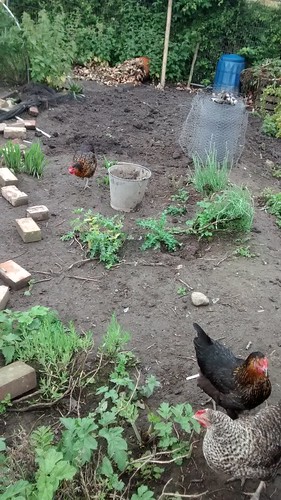
It may be incredibly late to be doing this but we are still planting potatoes. Other duties have got in the way. We will still get a crop but it will be smaller than if we had planted them in April or May. And we will be harvesting them later than usual. We have, however, had to clear some land to start planting. We had a bed of lavender next to the pond and duck enclosure but this is where the potatoes are going. Therefore, we've dug up the lavender and transferred the plants to the verge along the path leading to the allotment. We've been planting herbs along the verge as well recently. Anyone will be able to pick them - a useful way to use a space that is otherwise unused.
The land made available is gradually being planted out with potatoes. Not all our spuds are late. We have a crop of rooster potatoes (red skinned and great for baking) which got underway in April. They are coming along well and so far the hens and ducks have not wrecked them.
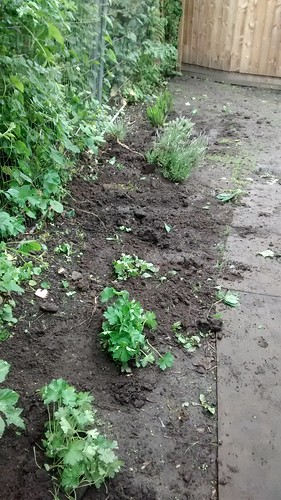
A brooding hen
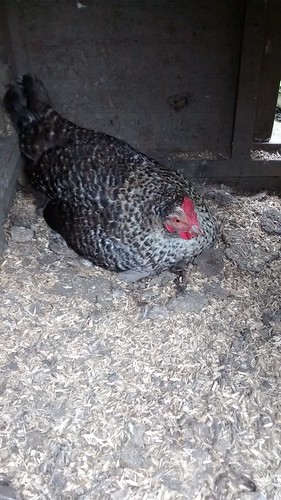
Our speckeldy hen is getting a bit broody. I am therefore thinking about giving her a batch of eggs to brood and hatch. We learnt some lessons last year on how best to handle a hen brooding eggs. If we do go ahead, we will move her from the allotment to the back garden where she will have a temporary run and a brood box. Last year when we had a hen with eggs, we left her in the henhouse but she was constantly disturbed and the eggs never hatched. This time, assuming we go ahead, she will be protected from disturbance.
A second swarm
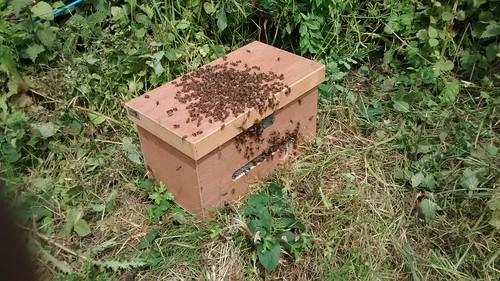
We had the second swarm of the week yesterday. It was on the allotment though on the neighbour's side of the hedge. It was easy to capture and by 6pm I had it in another hive. It brings the total of our hives up to 8. The two new hives will not produce honey for us until next year. The six established hives all now have supers on them to collect honey though the last one was only added today. I did a quick check of the hives at our Whickham apiary this morning. One has a super that is nearly full, one was empty, the other was the one I added today. The nearly full super will be left in place until July and then harvested.
Flowering sage
Friday 13 June 2014
Promoting the food network at Saltwell Park
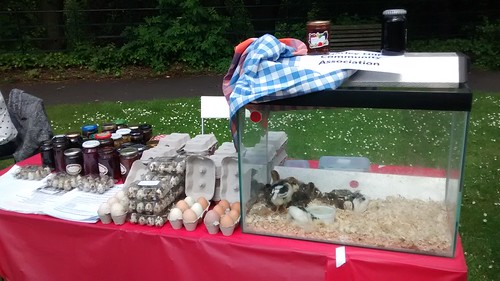
On Wednesday, Gateshead Carers' Association held a fayre at Saltwell Park, Gateshead, for organisation to promote their causes. I had a stall promoting the community cafe we run at Marley Hill Community Centre (usually on the last Sunday of the month) and the local food network I am setting up. The aim of the network is to encourage people who grow food on an allotment or in their garden, or who go shooting or fishing, to swap their surplus for other foods they don't produce themselves. At the Marley Hill Cafe, people can bring in their produce and swap it for our jams, eggs, honey and so on. These are early days but eventually I want to build a self-sufficient community.
There was quite a bit of interest in the idea when I spoke to people coming to my stall. The 12 chicks I took along were also a draw as well.
Salad planting
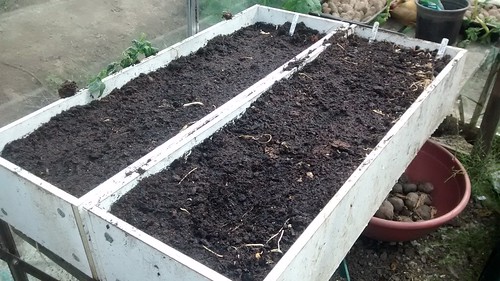
I am very behind schedule with my seed planting so today I made a big effort to make some inroads into the backlog. In the greenhouse, I planted radishes and spring onions in the two big seed boxes. And next to the duck enclosure I planted 3 rows of pink fur apple (a salad potato).
This is the time of the year before the main crops of vegetables are ready for harvesting and our greens need to come from wild leaves and fast growing salad crops. The radishes and spring onions should be ready for harvesting in six weeks.
Thursday 12 June 2014
Busy bees
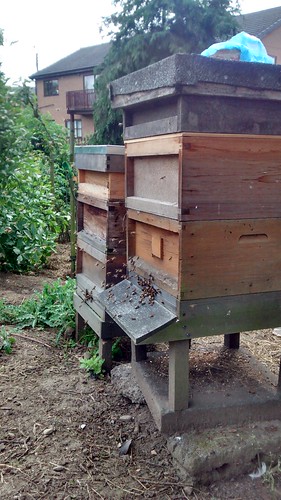
Today has been another warm, dry day, ideal for the bees. As you can see from these photos, they were very busy. I've been asked by lots of people when the honey will be ready. My best estimate is July. 5 of our hives have supers on them - the boxes in which the honey is collected - and we will be checking them soon.
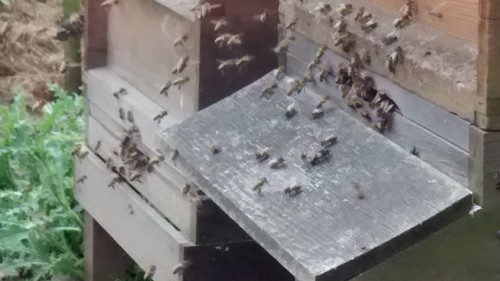
Tuesday 10 June 2014
New bee colony settling in
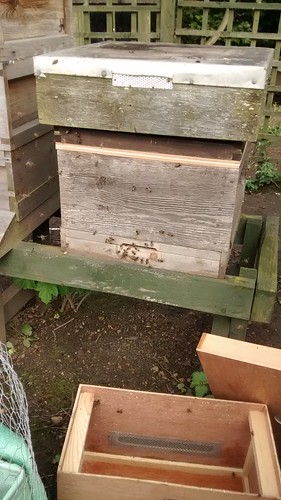
The honeybee swarm I collected yesterday went into a hive last night. I checked it this morning and it appears to have settled down well. There was quite a bit of traffic in and out of the hive entrance and it was noticeable that the bees were removing bits of leaves that had been on the floor of the hive. Cleaning the hive is always a good sign. We won't get honey from this hive this year. Next year however, it should produce a crop.
Monday 9 June 2014
Planting a late potato crop
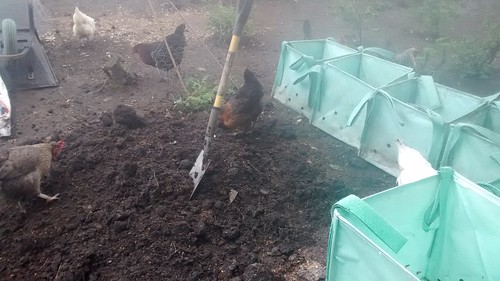
I have to confess, we are a bit late in planting some of our potatoes. In an attempt to catch up, I spent part of today creating soil to go into potato growing bags. I used rotten down chicken manure, some silt from a large puddle that fills up on the allotment as soon as it rains, and some top soil from the bed on the allotment where we now have the henhouses. Therefore, this bed is no longer used for growing produce.
With the help of the hens, I mixed the soil together and then added it to the 9 bags. I planted rooster potatoes. The bags have been placed in front of the beehives. The ground there is hard and stoney so is useless for growing anything. It's an efficient use of the site.
I put some metre wide chicken wire around the bags to keep the hens off them. Were they to break down the defences and get into the bags, they would kick the soil and seed potatoes all over the place. They've done that to us before!
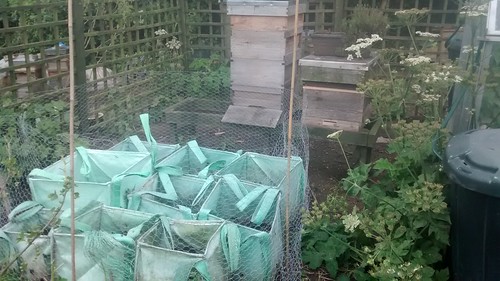
What I didn't want to do was buy commercial compost to use in the bags. Given the number of bags we have, this would have been an expensive undertaking. Furthermore, buying in what we can produce ourselves isn't exactly self-sufficient!
Another bee rescue
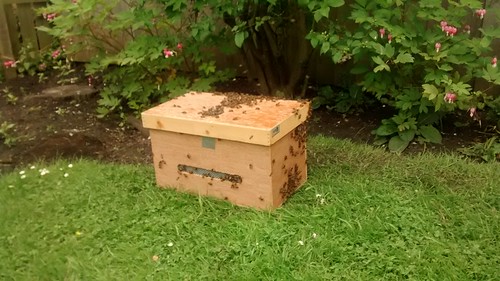
I have had lots of calls recently from local residents about bees in their gardens. Before today, all the calls had been about bumble bees. Today's call however was different. As soon as the resident said there was a large cluster of bees on a tree, I knew it was a honeybee swarm. I was around in minutes, complete with my smock, gloves and swarm box. Alas, this swarm decided it was not going to be straightforward capturing it. I shook it from the tree into the box but when I returned a couple of hours later, I found that the swarm had left the box and was sitting on the lawn as a perfect circle. I had never seen bees do this before.
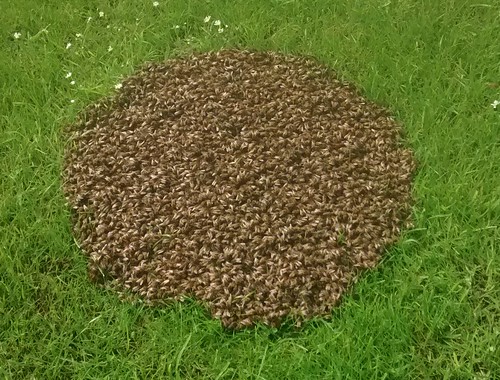
I had to put my gloves back on and scoop the bees up and drop them back into the box. This time, fortunately, it worked. At 9pm tonight I returned, found the whole of the swarm still in the box and took it to one of my apiaries where I had already set up a hive for it. By 9.30pm, the swarm was in its new home.
The resident said that she had phoned the council before she phoned me. They charged her £76 for the privilege of planning to call out in a few days' time. I suggested she cancel the visit as the council does not deal with honeybee swarms (they would simply advise her, once they had seen the swarm, to call a local beekeeper who could possibly have been me anyway) and ask for her money back. I understand that was what she did. She was happy to save the money, the council was saved a wasted journey and I was happy to have recovered a swarm which hopefully will produce me some honey.
Sunday 8 June 2014
Drenched at the fayre
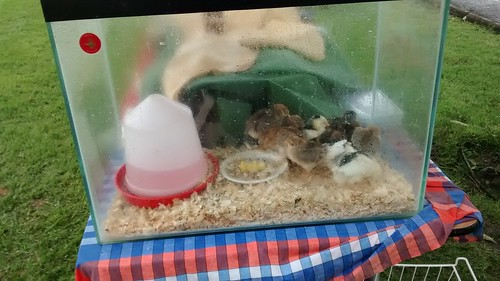
I had a stall at Whickham Chase Park Fayre yesterday. We had been hoping that the rain would stay away but the weather wasn't playing ball. The fayre opened at midday, just as the rain started. A 20 minute shower followed. Then it stopped. We hoped for the best and I had lots of people at my stall buying homemade jam and our eggs and taking an interest in our local food trading network.
Then at 2.30pm the weather let rip and it tipped it down. At that point we knew there was no way we could continue. It was a disappointing end but in the time it wasn't raining, trade and interest had been brisk.
I took along the chicks that hatched last week. They were a popular attraction.
Moving the chicks outdoors
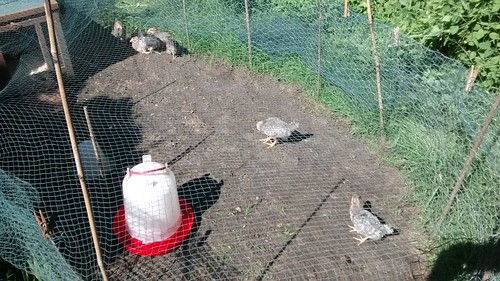
We have now moved the first batch of chicks that hatched in May outdoors into the back garden. They will stay there until they are big enough to go to the allotment to join the flock. Given the speed at which they grow, that won't be a long time coming.
We think 4 are cockerels. We will keep one but need to relocate the other 3. We will trade or sell them or, if necessary, slaughter them (they will usefully be fully grown by Christmas).
Gooseberries
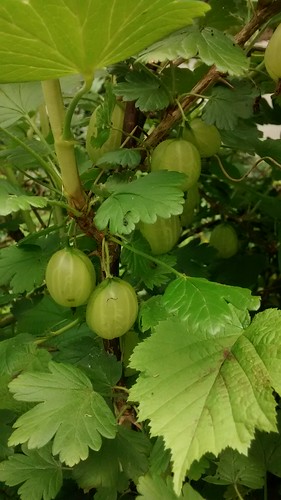
When I was in London earlier this week, I picked the gooseberries that were growing in my back garden there. One bush had big fruit on it. Another had none at all. I'm not sure why there was such a difference. My plan was to bring the gooseberries home to Sunniside and use them to make some jam. Sadly, as I was sitting on the train to come back to the North East, I realised I'd left the gooseberries in the fridge at our flat. I'll have to retrieve them the next time I'm down. Meanwhile, it looks like we will get a good crop of gooseberries from the shrubs we planted on our main allotment 2 years ago.
Thursday 5 June 2014
Back from London
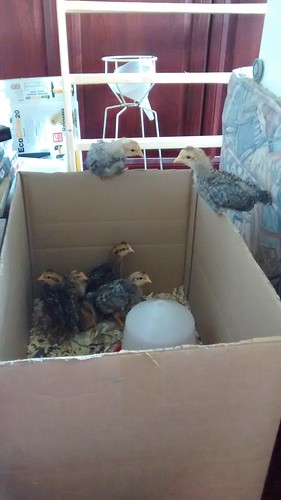
I got back from London this afternoon. I then checked out our incubation room. How quickly the chicks have grown! They have now developed their wing feathers and are able to get onto the edge of the box in which they have been temporarily housed. I found 2 sitting there feeling pleased with themselves. We will move them shortly to a run in the back garden where they will be for about 3 weeks before going to the allotment. The move won't be for a few days. The weather forecast up to the weekend is not good. Once the bad weather has passed us by, the chicks will move outdoors.
I was rather disappointed with the number of chicks that hatched at the end of last week. We had 21 eggs but only 12 chicks from them. We may need to incubate more or get chicks from a supplier.
Monday 2 June 2014
Ripening cherries
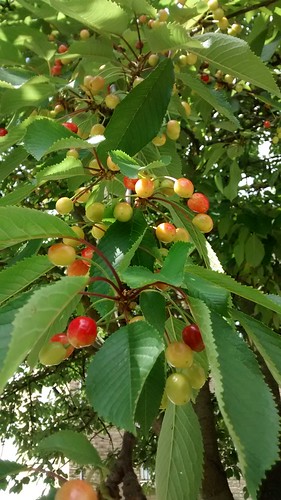
When down here in London in the spring, I often spot the differences caused by the warmer southerly climes compared to where we are back home. In May and June, the biggest difference is the cherry crop. It is about three weeks earlier in London. I've looked at some of the trees here and again, it looks like a good crop. I won't be able to pick them here though as I'm unlikely to be in London soon enough once they have ripened to beat the pigeons to them. Back home however, we are hoping for a significant crop. Cherry pies will be making an appearance in our kitchen soon.
Looking ahead to a good plum crop
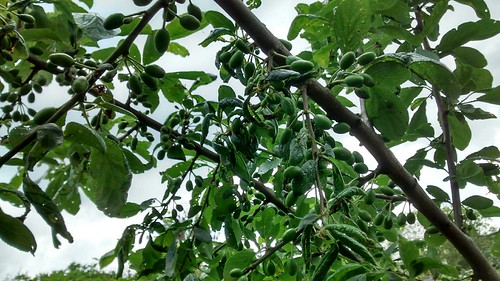
Last year I was a bit disappointed with the crop of Victoria plums from the tree on our allotment. This year, it looks like we are heading for a much more successful crop. The above photo was taken at the end of last week and it shows lots of small fruit developing. Some of these will be lost before they can ripen but overall, this tree should produce much more fruit than last year. I'll need to dust down recipes for plum jam.
Quail egg salad
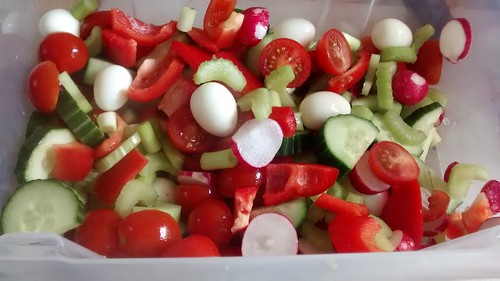
I'm down in London for a couple of days. David is back home looking after the livestock. When I come to London I tend to bring food parcels rather than rely entirely on shops for our food. Alas, the food parcel this time consisted only of 2 dozen quail eggs. Before coming to London, we had not used any of the eggs ourselves. Well, now we have. They went into a salad yesterday. There was a community picnic near our London flat so I went along to it with a friend and our contribution was the quail egg salad. It was noticeable that, though there was food left at the end (which I think went to the local scout group), there were now quail eggs left in the remaining salad!
Subscribe to:
Posts (Atom)
